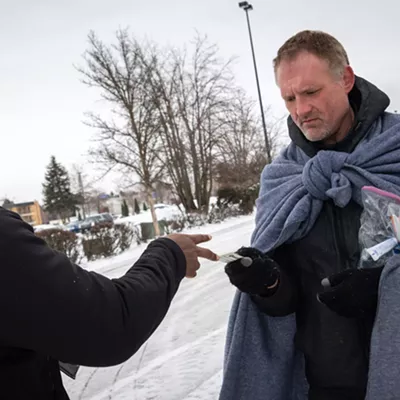
When 2024 begins later this week, Spokane will have a different mayor, City Council president and police chief than it did when 2023 began. Next year, we may have a different president, member of Congress and, for sure, governor. Simple reminders that a lot can happen in a year.
This year, our news team covered everything from the politics of small-town Idaho to the Doomsday Vault on the Palouse. We covered Spokane's most notorious intersection, and the continuing national tragedy that is our unsafe streets. And we followed the hyper-politicization of our local school boards and the ongoing hunt for COVID fraudsters.
We did it fairly and accurately, unbeholden to any agenda other than to serve our readers with the highest quality news and writing we could muster.
— NICHOLAS DESHAIS, editor
SECOND AND DIVISION
One of the Inlander's most widely discussed stories this year was our cover story on Second Avenue and Division Street — an infamous, heavily trafficked Spokane intersection that's long struggled with drug use, crime and poverty.Photographer Erick Doxey and I spent a weekend in July at the intersection talking to the people who live and hang out there. People were candid and willing to share their stories. One man told us he's overdosed and been saved with Narcan about 10 times. Another said he wishes he could still find heroin, but that the supply has almost entirely been replaced with fentanyl.
Shortly after the story came out, Spokane City Council members met with leadership from Catholic Charities, which operates low-barrier housing in the area, and Spokane police to discuss the challenges facing the intersection.
Police Lt. Dan Waters said the area had become "full on crisis mode," and he discussed several ideas to stop people from congregating in the area, including lights, music, cutting down trees, fencing and even closing off part of the street. Perhaps the wildest suggestion was to move people along with street preachers.
Several weeks later, Mayor Nadine Woodward held a press conference at the intersection to announce that she was "resetting expectations" and doubling down on police patrols. She later claimed that the area had seen a decrease in property crime.
The city's larger problems of fentanyl and homelessness, however, remain far from solved. The intersection remains troubled — a small piece of a societal emergency decades in the making. The goal of the piece was simply to document the consequences and, hopefully, show people's humanity in the midst of it all. (NATE SANFORD)

SO MANY SEEDS
Late last year, while visiting my parents for Thanksgiving in Pullman, I ran into an old classmate and we shared quick updates about our personal and professional lives. Wasn't she working on a farm of some type these days? Yes, but it was so much cooler than that.Unbeknownst to me — a person who devours science fiction and pays too much attention to the dystopian present — there's a freaking local version of the Doomsday Vault in the tiny little town I grew up in!
This vault wasn't built to hold people, like the bunkers of the Cold War era. Instead it's part of an international network of seed banks saving people another way: The network stores and maintains a vast collection of genetically diverse plant material so that we don't monocrop ourselves into oblivion. This way, there's a chance to fight new or ancient, reawoken pests, and to replenish agriculture when disaster strikes. With well over 100,000 containers holding different kinds of peas, lentils, beans, lettuces, grasses, flowers and more, Pullman's bank has one of the most diverse collections in the national system, and requires a staff of more than two dozen people to operate.
That farm? They're constantly planting seeds from the rows and rows of jars and envelopes kept inside a gigantic refrigerator in order to keep the stores viable and harvest new seeds. Badass science for the win. (SAMANTHA WOHLFEIL)
SLUGFEST
In case you didn't hear: Spokane elected a new mayor.Lisa Brown — a former state Department of Commerce director, chancellor for Washington State University Spokane and state Senate majority leader — defeated incumbent Mayor Nadine Woodward in November and, come January, will be Spokane's 46th mayor.
It was a very long campaign. Immediately after Brown announced her candidacy in early March, the Spokesman-Review ran a headline quoting former City Council member Steve Corker's prediction that the race between Brown and Woodward would be a "slugfest."
He was right. Over the course of nine months, Brown and Woodward clashed frequently — in debates, dueling press conferences and late-night posts on the website that used to be called Twitter.
The high-stakes race also prompted an unprecedented amount of political spending. Both Brown and Woodward smashed fundraising records with more than $500,000 each in direct contributions. In early November, we reported on how millions of dollars in outside spending had poured in from political action committees — the majority of which was spent boosting conservative candidates and attacking progressives.
The biggest surprise of the race came in late August, when Woodward made an unexpected appearance onstage at a Christian worship festival with former state Rep. Matt Shea, a Spokane Valley Republican who was ostracized from mainstream politics because he was accused of religious extremism and domestic terrorism.
Woodward insisted that she didn't know Shea would be there and denounced his politics. But the controversy never really died down.
In the end, the heavy amount of spending in favor of conservative candidates largely failed to pay off. Brown won in November with 51.8% of the vote. (NS)
SCHOOL BOARD MAYHEM
If you went to a school board meeting before 2020... who am I kidding, practically nobody went to school board meetings back then. However, with the prevalence of online learning in the wake of a pandemic, parents quickly began to take a more active role in their children's education. This led to continued outcry about perceived faults in the system and these meetings filling up like never before.Virtual classrooms. Masking. Vaccinations. Critical Race Theory. LGBTQ+ "agendas." Sexual education. Low transparency. Lack of parental rights. You name it and somebody was probably outraged by it.
This all boiled over in 2023 when school board races across the Inland Northwest filled with candidates vehemently opposed to the very system they hoped to lead — and vowed to change. And while races for Spokane's mayor and City Council often led our news coverage, school board elections took a safe second place, when in previous years they struggled for a participation trophy.
Between Medical Lake's crowded 17-person primary making it the largest in the state, the Central Valley School District Board race that saw all three open positions contested for the first time in more than 20 years and the recall of two trustees from Idaho's West Bonner School Board recording voter turnout similar to a presidential election, this year was full of firsts.
Records were also made. The Mead School Board race between two newcomers — Jennifer Killman and Jaime Stacy — saw nearly $70,000 in campaign fundraising and outside spending, which made it the most expensive school board race in the state.
Then as ballots were counted we all waited with bated breath for the results, but could discern no real themes or patterns in particular.
Voters in Spokane and Medical Lake overwhelmingly voted against challengers hoping to unseat established incumbents. But in Central Valley and Mead, voters chose challengers to take the place of school board members with a combined tenure of about 60 years (Debra Long, 20 years; Keith Clark, 16 years; Denny Denholm, 24 years).
This gave both Mead and Central Valley a more conservative majority, the effects of which will become clear in the new year. (COLTON RASANEN)
DEVASTATING FIRES
In mid-August, after days of record-setting high temperatures, fires swept through Medical Lake and Elk, killing two people and destroying hundreds of homes. Over the course of 48 hours, Spokane County saw more than 20,000 acres go up in flames, with at least 265 structures destroyed. The fires raged over the late summer weekend, forcing evacuations and drawing help from fire departments all across the state and region. After the Gray and Oregon fires (named for the roads they started next to), the community rallied to help those who were impacted. The county has been working with homeowners to find property tax relief, many organizations and businesses held fundraisers, and others offered help getting grants and looking for options as people decided whether to rebuild. Multiple lawsuits were filed claiming that Inland Power and Light electrical equipment sparked the Gray Fire.During the upcoming legislative session, local lawmakers plan to ask for more relief. State Reps. Mike Volz, R-Spokane, and Suzanne Schmidt, R-Spokane Valley, plan to bring a bill forward that will allow 2023 wildfire victims to rebuild under the building codes that were in place on Jan. 1, 2023. New rules from the state building code council may add thousands of dollars to the cost of new residential construction, and the lawmakers say that's not fair to the fire victims, whose insurance might not cover the increase. (SW)
ESCAPE FROM AFGHANISTAN
As a journalist, you never know when a seemingly simple story — say, a quick interview with an author about their new book — will lead you to a much more meaningful story.In early 2021, I interviewed Cheney author Trent Reedy and his Afghan co-author Jawad Arash about their young adult novel, Enduring Freedom. It was a thinly veiled retelling of how the men met and became unlikely friends. (Trent, a soldier, met Jawad, a high school kid who wanted to practice his English.) The book promotes education and freedom for girls, and has an overall hopeful message. I knew "Jawad Arash" was a pen name, but I was somewhat surprised that the author wouldn't show his face on Zoom or say which Afghan city he was in. I didn't understand how precarious things were when I asked what they thought about the announcement that all U.S. troops would leave Afghanistan later that year.
Both men were worried that the Taliban would immediately take back control.
Months later, that's exactly what happened. We watched with horror as people were trampled to death, clung to the side of evacuation planes and faced terrorist attacks at the Kabul airport as they tried to leave. Many with ties to America were worried they'd be hanged.
On Aug. 15, 2021, the Taliban seized control of the government as the president fled.
On Aug. 17, 2021, I wrote to Trent to ask if he was doing OK, but more importantly, to see if he'd been able to check if Jawad and his family were safe. They weren't.
As a matter of fact, for nearly the next two years, the first thing Trent would do when he woke up and the first thing he would do before bed was message his friend to see if he was alive. I didn't know the hell they'd gone through trying to get Jawad's family to safety until Trent reached out to me in late June this year to say there was FINALLY a light at the end of that dark tunnel.
A month or so later, I was able to interview Jawad by video chat and finally see his face. He and his family had made it safely to America.
Trent and Jawad were incredibly gracious and vulnerable in allowing me to share their story. They let me look through hundreds of messages they'd exchanged over the last two years (just a tiny sample of their daily chatter) and each spoke to me for hours. Thanks to their openness, our readers were able to get an up-close look at the incredibly difficult journey still facing many who worked with our government in some form or fashion over the last 20 years. (SW)
COVID FRAUD
We've spent almost four years now covering the effects of the pandemic, so I guess that means we should say, "Happy Fourth Birthday COVID!" Let's all celebrate by making sure we're up to date on our boosters and stocking up on at-home tests.There's another number to keep in mind: 1 billion. That's the dollar amount of COVID fraud some estimate took place in Washington state alone. So, in 2023, we began to focus less on the virus itself and instead turned our attention to the folks who used a worldwide pandemic for personal gain.
"We should be able to trust the public to not defraud the government."
As the U.S. tried to mitigate the effects of the pandemic on the nation, it passed trillions of dollars in relief funds. Some were for employers who couldn't continue to pay their employees or keep the doors open, and others were created to help tenants fulfill their rental requirements. But all of these programs were created to address the negative impacts that the pandemic wrought.
However, because this relief was passed as quickly as possible to help the population, it lacked proper oversight measures, which led to more than $100 billion being fraudulently obtained throughout the country, according to the U.S. Small Business Administration.
This led U.S. attorneys across the country to go on the hunt for these missing federal funds. In Eastern Washington, U.S. Attorney Vanessa Waldref made it a top priority for her office to address the flurry of fraud in the region — thus the Eastern Washington COVID-19 Strike Force was created and began to take action.
In October, we reported on that effort and spoke with Waldref and Assistant U.S. Attorney Dan Fruchter to investigate the steps their office was taking to recoup these fraudulently obtained funds. At the time, they had already recovered about $4 million and expected millions more to come back through restitution.
"We should be able to trust the public to not defraud the government," Waldref told us. (CR)
KOVACS QUAGMIRE
In February, we received public records months after asking a seemingly simple question about Béla Kovacs: Why had he left his job as the purchasing director for Spokane County in 2018?Kovacs was appointed as the Kootenai County assessor after the death of the previous officeholder in 2020. Since then, dozens of his employees have voiced their lack of confidence in his ability to lead their office, which plays an instrumental role in the county's ability to collect taxes. Assessor's staff members say Kovacs gaslights and belittles them, blames others when things go wrong, and keeps tabs on conversations he's worried could be about him.
The records from Spokane County, where Kovacs worked for nearly 20 years, revealed that Kovacs had resigned in lieu of termination following an investigation into similar issues with staff there. By hiring a lawyer to block my public records request, Kovacs was able to delay the release of the Spokane documents until after last year's November election, when he was formally elected to remain in the post.
The Kootenai County commissioners weren't aware of the issues in Spokane when they appointed Kovacs. Last year, they asked him to resign after his office missed key deadlines, but Kovacs refused. So, they slashed his pay in half to encourage him to leave, but as an elected official there was little else they could do. In May, a Kootenai County judge ordered the commissioners to reinstate his full pay, with a raise. (SW)
HOMELESSNESS WORSENED
Throughout 2023, we continued to document Spokane's worsening homeless crisis.Amid rising housing costs, Spokane County's homeless population increased by 36% between 2022 and 2023, according to the city's point-in-time count.
Early summer saw the closure of Camp Hope — the East Central homeless encampment that lasted for more than a year and at its peak had an estimated population of more than 600 people. Its closure marked the end of a prolonged conflict between local and state leaders. The end of Camp Hope did not, however, represent an end to Spokane's homeless crisis. Many of the people who lived there are still homeless.
In May, former Inlander writer Daniel Walters wrote an in-depth cover story highlighting the great lengths a San Diego tech executive went through while wandering the streets of Spokane in search of his homeless son. Despite numerous setbacks, the man and his son were eventually able to reconnect.
Spokane County's homeless population increased by 36%.
In the wake of Camp Hope, we reported on how local leaders were working together to explore the creation of a regional homeless authority that would pool resources and unite Spokane's homeless response under a single entity.
The idea of a regional entity has a notable level of bipartisan support, though many elected officials still have their own individual concerns about how the authority will operate and who will be in charge of distributing the millions of dollars in local, state and federal funds that flow through it.
When the idea was first pitched this summer, the volunteers leading the effort proposed moving on an accelerated timeline and standing up the authority by the end of the year. This did not happen. Elected officials are continuing to meet regularly to discuss the structure of the authority, and seem to be on track to get something finalized by the end of 2024. (NS)
SAD GOOSE SUMMER
Sandpoint really hates having geese hanging out in its City Beach park. In previous years, the city worked with the state to tag dozens of geese with leg bands and relocate them far away. But, as is the nature of migratory animals, they soon returned, along with all that pesky poop they drop on the daily. Last winter, the city authorized a good ol' fashioned goose hunt in the park, just blocks from the downtown core, but only one goose was killed. So, this June, the city resorted to hiring a federal agency to round up all the geese they could find (170 of them) and kill them with CO2 gas. Days later, multiple banded geese were found chilling in the park again — turns out, they love to eat grass, and who can beat those views of Lake Pend Oreille? (SW)
CARS KEPT KILLING
In April this year, we wrote a lengthy cover story highlighting the disturbing uptick in traffic fatalities locally and across the nation. Drivers killed 750 people in Washington in 2022 — the highest number since 1990. As the year comes to a close, the numbers are on track to be even higher.We highlighted some of the city's most dangerous intersections and explored how decades of car-centric road design had created an environment hostile to people trying to move through the city on foot or bike.
Our cover story centered on a recent lawsuit involving a pedestrian who was struck by a driver while trying to cross the street at the intersection of Division Street and Rhoades Avenue in north Spokane. The man hit by the car was left with debilitating injuries. He successfully sued the city of Spokane for $3.1 million, arguing that the city had failed to improve the intersection despite a prior study showing it was unsafe.
At the time, we reported that the city had plans to install pedestrian crossing beacons at the intersection this fall with funding from a federal safety grant. But as 2023 comes to a close, construction has yet to begin. (NS)























